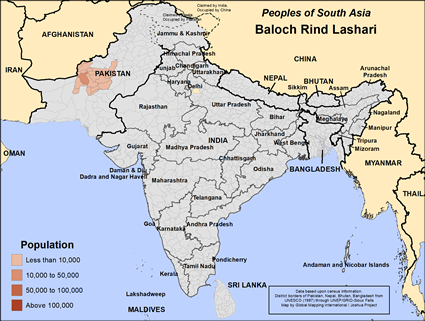The name, "Baloch," is shrouded in controversy. Some say it means "nomad," while others claim that it is an old Persian word meaning "the cock's crest." Their history is just as mysterious. Some have traced their origins to Nimrod, son of Cush (Noah's grandson). But while some things are uncertain, we do know that they first moved to the region in the twelfth century. During the Moghul period, this territory became known as "Balochistan."
Their homeland reaches from eastern Balochistan to southwestern Punjab, which borders India. This high, dry region was once a very populated country watered by a large number of flowing rivers. Today, it is a barren area of rocky mountains and dry river valleys mixed with desert land. Most Baloch live in this region, which carries their name, but there are smaller Baloch communities in India, Afghanistan and Sri Lanka. The Baloch have three major Baloch dialects, one of which is Southern Balochi, spoken by the Rind Lashari subgroup.
The Rind Lashari Baloch traditionally earn their living by a combination of farming and semi-nomadic shepherding. They usually raise sheep, cattle, or goats. Agriculture is limited because of the harsh climate; nevertheless, it plays a large role in the economy. The chief crop is wheat. To aid in the household economy, some farmers raise chickens. They also depend on wild fruits and vegetables.
One wild plant, called the "dwarf palm," is used as a dietary supplement. The Baloch peoples eat the meat of the palm and use the leaves to make ropes, shoes, mats, spoons, tents, and pipes. Techniques of survival differ from valley to valley and from high mountain areas to lowland plains. However, each community tries to keep as many different farm animals as possible and to grow a wide variety of crops.
The Rind Lashari Baloch have overcome the obstacles of living in an extremely harsh, arid climate. Today, most of them live in two types of settlements that are conducive to their semi-nomadic lifestyle. Their permanent villages consist of clusters of mud houses, loosely organized around the home of the local chief. They live in these mountain and valley settlements in the summertime. However, in winter, they migrate to the plains and coastal areas, seeking green grass for their livestock. During this time, they live in tents, and move freely across the landscape as weather conditions dictate. These temporary settlements are smaller, consisting of closely related kin.
Rind Lashari Baloch marriages are arranged between the bride's father and the prospective groom. Once a woman is married, she passes from the authority of her father to that of her husband. Marriages are monogamous and lifelong, and marrying a non-Baloch is strictly forbidden.
Baluchmayar, or the "Baluchiway," is the honor code by which all Baloch tribes live. These principles include extending hospitality and mercy, dealing with each other honestly, and offering refuge to strangers. They are preserved through both songs and poetry. Children learn proper behavior by watching their elders and are taunted whenever they misbehave.
Many Rind Lashari Baloch cannot read or write and until recently, their language was unwritten. However, they have a long tradition of poetic compositions. They have high regard for poets and professional musicians.
The Rind Lashari Baloch people embrace Sunni Islam as the core of their spiritual life. Their faith deeply influences their daily routines, moral values, and social structures. They observe the five pillars of Islam with devotion, including daily prayers, fasting during Ramadan, and making the pilgrimage to Mecca if possible. Religious leaders, known as mullahs, play crucial roles in guiding spiritual practices, resolving disputes, and leading religious ceremonies. The community gathers for Friday prayers at local mosques, reinforcing their sense of unity and spiritual commitment.
In addition to mainstream Islamic practices, the Rind Lashari Baloch people hold a profound respect for Sufi traditions. Sufi saints and shrines hold special significance, with many Baloch making pilgrimages to these holy sites. They believe in the intercessory power of saints and seek blessings and guidance through these visits.
Folk traditions also intermingle with Rind Lashari Baloch Islamic beliefs. They recount stories of spiritual encounters, valor, and moral lessons through oral poetry and songs, which strengthen their cultural identity and moral values. They observe various religious festivals with enthusiasm, celebrating Eid al-Fitr and Eid al-Adha with community feasts, prayers, and social gatherings.
For the Rind Lashari Baloch, Islamic their spiritual beliefs form the bedrock of their identity, guiding their actions, community interactions and perspectives on life.
The Rind Lashari Baloch have been isolated for many years due to harsh climate, the difficulty of communicating in mountainous terrain, and their reputation as bandits. The Pakistani government is building roads into Balochistan, but the Baloch peoples are suspicious of their motives.
Pray for the Holy Spirit to give the Rind Lashari Baloch people teachable and understanding hearts.
Pray that a strong movement of the Holy Spirit will bring entire Rind Lashari Baloch families into a rich experience of God's blessing.
Pray for Rind Lashari Baloch families to be drawn by the Holy Spirit to seek forgiveness, and to understand the adequacy of Christ's work on the cross.
Pray for teams of believers to do sustained, focused prayer for the Lord to open the hearts of Rind Lashari Baloch family leaders to experience God's blessing through a movement of family-based discovery Bible studies.
Scripture Prayers for the Baloch Rind Lashari in Pakistan.
https://joshuaproject.net/people_groups/11684
https://www.britannica.com/topic/Baloch
https://www.atlasofhumanity.com/baloch
https://www.quora.com/What-is-your-opinion-about-Baloch-people
| Profile Source: Joshua Project |











